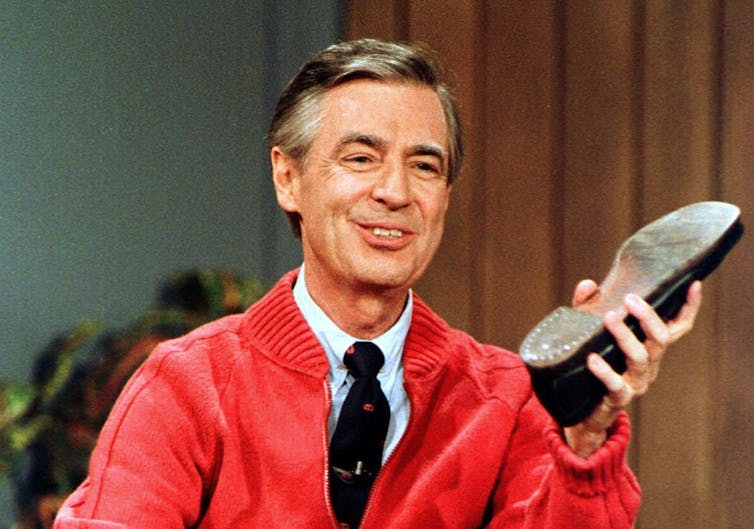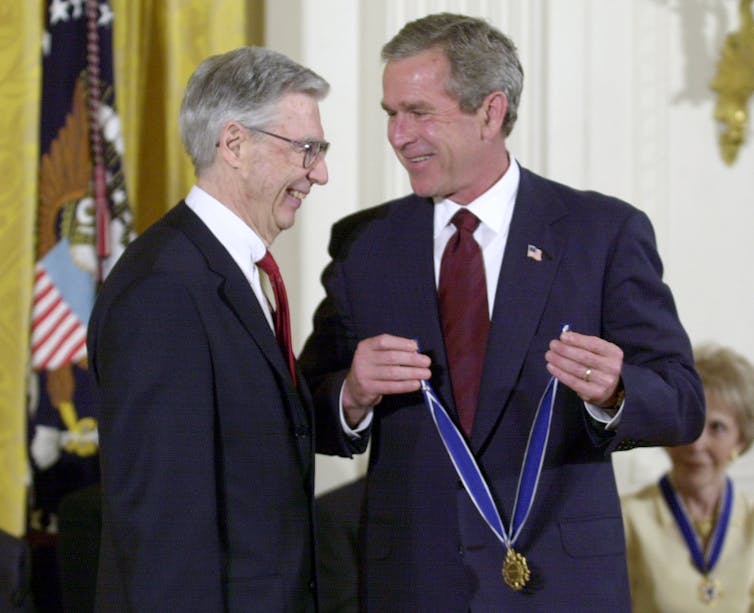Why Mister Rogers’ message of love and kindness is good for your health – CWEB.com

Gene J. Puskar/AP File
Richard Gunderman, Indiana University
The release of the Mister Rogers documentary, “Won’t You Be My Neighbor?” calls to mind the essential message of Rogers’ long-running children’s program, “Mister Rogers’ Neighborhood.” Fred McFeely Rogers, who died in 2003, was also an ordained Presbyterian minister. Over the course of three decades on public broadcasting, he brought to millions of children what his faith’s General Assembly referred to as “unconditional love.”
In preaching love, Rogers wasn’t just attending to the moral character of his youthful audience. He believed that he was also promoting their health. As he said in 1979, “My whole approach in broadcasting has always been, ‘You are an important person just the way you are. You can make healthy decisions.’ Maybe I’m going on too long, but I just feel that anything that allows a person to be more active in the control of his or her life, in a healthy way, is important.”
Since Rogers’ death, evidence has mounted that he was on to something — namely, that love and kindness truly are healthful, and that people who express them regularly really do lead healthier lives. Simply put, people who are generous and volunteer their time for the benefit of others seem to be happier than those who don’t, and happy people tend to have fewer health complaints and live longer than those who are unhappy.
Love gave rise to a calling
Born in Pennsylvania in 1928, as a young minister Rogers regretted the messages television was conveying to children in the 1960s. He said, “I went into television because I hated it so, and I thought there’s some way of using this fabulous instrument to nurture those who would watch and listen.” “Mr. Rogers’ Neighborhood” debuted nationally in 1968 and won its creator and host many accolades, including a Presidential Medal of Freedom, two Peabody Awards, and over 40 honorary degrees.

Kenneth Lambert/AP Photo
Rogers believed that the need to love and be loved was universal, and he sought to cultivate these capacities through every program, saying in a 2004 documentary hosted by actor Michael Keaton, one of his former stagehands, “You know, I think everybody longs to be loved, and longs to know that he or she is lovable. And consequently, the greatest thing we can do is to help somebody know they’re loved and capable of loving.”
Love and health
As it turns out, there are many ways in which love and kindness are good for health. For one thing, they tend to reduce factors that undermine it. Doing something nice for someone causes the release of endorphins, which help to relieve pain. People who make kindness a habit have lower levels of stress hormones such as cortisol. Intentionally helping others can even lower levels of anxiety in individuals who normally avoid social situations.
Carrying out acts of kindness, or even merely witnessing them, also increases levels of oxytocin, a hormone with health benefits as diverse as lowering blood pressure, promoting good sleep and reducing cravings for drugs such as cocaine and alcohol. That oxytocin should have so many health benefits is not so surprising when we recall its central role in stimulating uterine contractions during birth, the letdown of milk during lactation, the pleasure associated with orgasm and pair bonding.
Acts of generosity and compassion also appear to be good for mood. A 2010 study showed that while people with money tend to be somewhat happier than those without it, people who spend money on others report even greater levels of happiness, an effect that can be detected even in toddlers. When people give money to others, areas of the brain associated with pleasure are activated, and this response is greater when the transfer is voluntary rather than mandatory.
Such happiness can have big benefits in longevity. For example, a review of 160 published studies concluded that there is compelling evidence that life satisfaction and optimism are associated with better health and enhanced longevity. Another study of older people showed that, even after correcting for other factors such as age, disease and health habits, those who rated their happiness highest were 35 percent less likely to die in five years than those who were least content.
[youtube https://www.youtube.com/watch?v=9TXBP1t2rUc&w=560&h=315]
What would Mister Rogers say?
Of course, Rogers would remind us that there are reasons to be committed to love and kindness that extend far beyond their health benefits. Rogers was, after all, not a physician but a minister, and ultimately he was ministering to an aspect of human wholeness that cannot be analyzed by blood tests or visualized with CT scans. In a commencement address at Dartmouth College in 2002, he focused less on the body than what he might have called the spirit:
“When I say it’s you I like, I’m talking about that part of you that knows that life is far more than anything you can ever see or hear or touch. That deep part of you that allows you to stand for those things without which humankind cannot survive. Love that conquers hate, peace that rises triumphant over war, and justice that proves more powerful than greed.”

Jay Godwin/LBJ Foundation
When Rogers encouraged children to be kinder and more loving, he believed that he was not only promoting public health but also nurturing the most important part of a human being — the part that exhibits a divine spark. As Rogers indicated in another commencement speech the year before at Middlebury College, “I believe that appreciation is a holy thing, that when we look for what’s best in the person we happen to be with at the moment, we’re doing what God does; so in appreciating our neighbor, we’re participating in something truly sacred.”
In expressing such deeply religious sentiments, Rogers was not trying to undermine a concern with bodily health. In fact, he regularly encouraged his viewers to adopt healthy life habits, and Rogers himself was a committed vegetarian and lifelong swimmer who maintained a low body weight his entire life. Yet he also believed that health alone does not a full life make, and he regarded the soundness of the body as but part of the wellness of whole persons and communities, which may explain why he was able to face his own mortality with such equanimity.
Just a few months before he died, Rogers recorded a message for the many adult fans who had grown up watching “Mister Rogers’ Neighborhood.” In it, he practiced what he preached, saying:
![]() “I would like to tell you what I often told you when you were much younger. I like you just the way you are. And what’s more, I’m so grateful to you for helping the children in your life to know that you’ll do everything you can to keep them safe. And to help them express their feelings in ways that will bring healing in many different neighborhoods. It’s such a good feeling to know that we’re lifelong friends.”
“I would like to tell you what I often told you when you were much younger. I like you just the way you are. And what’s more, I’m so grateful to you for helping the children in your life to know that you’ll do everything you can to keep them safe. And to help them express their feelings in ways that will bring healing in many different neighborhoods. It’s such a good feeling to know that we’re lifelong friends.”
Richard Gunderman, Chancellor’s Professor of Medicine, Liberal Arts, and Philanthropy, Indiana University
This article was originally published on The Conversation.


